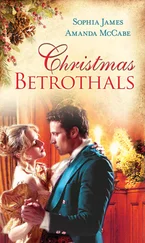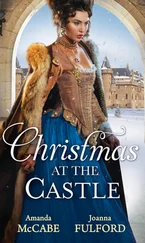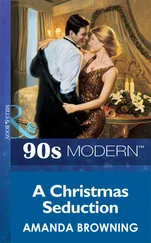“My husband,” I said, with a deliberateness born of disbelief, “is in Iceland.” I’d telephoned the cottage as soon as we’d arrived at the Flamborough and Willis, Sr., had given me an update on Bill’s travels. “His plane landed in Reykjavik for refueling this morning and wasn’t allowed to take off again because of high winds.”
“Oh, Lori”—Julian heaved a sympathetic sigh—“I’m so sorry.”
I should have been, too. My family-round-the-hearth fantasy had turned into a family-round-the-world farce. I thought of Bill marooned in Iceland, of unthawed turkeys, unwrapped presents, and unhung wreaths, and began, unaccountably, to giggle.
“Ah, well,” I said airily. “Iceland’s not too far from the North Pole. Maybe Bill can hitch a ride with Santa Claus.”
“No more brandy for you, Ms. Shepherd.” Julian put his Waterford tumbler on the rosewood table beside his chair and yawned hugely. “No more for me, either. If I don’t go to bed this minute, I shall fall asleep sitting up.”
“You’ll regret it if you do,” I said. “The beds here are even cushier that the chairs.”
“I find that extremely hard to believe,” said Julian, “but I’m willing to put it to the test.” He pushed himself to his feet. “Good night, Lori.”
“Good night, Julian.” I watched him amble slowly to his bedroom, finished my drink, and went to mine.
Despite the brandy and the old-cotton softness of the embroidered bedclothes, I found it difficult to fall asleep. I’d telephoned the Radcliffe after I’d spoken with Willis, Sr., half hoping that a Christmas miracle had occurred and that Kit had finally awakened from his coma. But no miracle had taken place. If anything, Kit had weakened slightly. I said a silent prayer for him, pushed the covers aside, and climbed out of bed.
I stood before the window for a time, gazing down at the gusts of snow haloing the street lamps. The glass was too thick, the frame too solid to let in the wind’s howl, but I could hear it nonetheless, and no amount of brandy could chase away the chill it sent through my soul.
Somewhere out there, someone like Kit was slowly freezing to death. In a doorway, under a bridge, or in plain sight of shoppers hastening home with armloads of last-minute purchases, someone was cold, hungry, and alone. I pressed my palms to the glass and let the chill course though my body.
I needed the howling wind, needed it to remind me that I was part of a world stretching beyond the snug circle of my family and friends. There was work to be done in that world, and I was blessed beyond all reason with the means to do it.
“Let us see in the poorest among us the face of the Christ Child.” I whispered the vicar’s words as a promise to Kit, to Julian, and to myself, then turned toward bed.
Julian and I had nearly finished our room-service breakfast the next morning when a knock sounded at the door of the suite.
“Madam?” called a familiar voice. “Limo’s ready.”
I flew to the door and flung it open. “Paul!” I exclaimed. “I didn’t know you were available. I was about to call down for snowshoes.”
The gray-haired little man in the navy-blue chauffeur’s uniform touched two fingers to his forehead, since he was holding his visored cap in his hand, and executed a formal half-bow. “No need for that, madam. Miss Kingsley said I was to take you round to Belgravia, then whisk you back to the cottage toot sweet.” His brow furrowed anxiously. “Your party’s still on, isn’t it, madam?”
Visions of unthawed turkeys danced through my head, but I smiled bravely and said, “It sure is.”
Paul relaxed. “Been looking forward to it, madam. Very kind of you to invite me, I’m sure.” He gripped his cap with both hands. “Don’t mean to rush you, but the storm’s left the city in a bit of shambles, and it may take some time for us to—”
“We’re on our way,” I said, and called for Julian to drop his toast and grab his jacket.
“Never seen nothing like it,” Paul muttered. The window separating driver from client in the long black limousine was never closed when I was Paul’s passenger. “Lived in London my whole life, madam, and I’ve never seen snow like this.”
The blizzard had indeed left Paul’s beloved birthplace in a bit of a shambles, but it was a peaceful shambles. The storm had forced many businesses to close, thereby reducing the number of harried, list-toting shoppers to near zero. Few pedestrians, it seemed, were willing to clamber over the vast mountain ranges of plowed snow piled at each intersection, and even fewer drivers trailed in the wake of the exhaust-belching snowplows that now ruled London’s streets.
As a wealthy residential district, Belgravia received priority treatment from the city’s fleet of plows. Paul had little trouble maneuvering the limousine through the snow-tunneled thoroughfares to the gates of Havorford House. While Julian spoke into a gatepost-mounted intercom, requesting an interview with Lady Havorford concerning her brother, I craned my neck to view the mansion Kit had fled on that cold February night four years earlier.
Havorford House was several centuries removed from Stepney’s postwar council housing, a rigidly symmetrical Palladian palace in silver-gray stone that rose, gleaming, from the center of a small but exquisite walled garden. A filigreed wrought-iron fence separated the garden from the street, and a half-circular drive curved beneath the mansion’s porticoed entryway. If snow fell again that day, it would not fall on Lady Havorford’s guests.
Gold glittered everywhere, as if the mansion had been gilded for Christmas. Each tree in the garden was hung with tiny golden lights that bobbed in the breeze like dancing fireflies. Golden baubles dangled from the topiary yews lining the drive, gold mesh bows crowned the gates, and candles burned in every window, before massed groupings of white poinsettias. I gazed at the splendid golden wreath adorning the front door and felt my heart burn with envy. I was willing to bet my handmade Italian boots that Felicity Havorford’s Christmas tree didn’t list.
“It’s perfect,” I said dismally.
“Too perfect,” Julian noted.
I took what consolation I could from his words, knowing that no one could possibly aim that particular barb at the cottage.
The gate finally swung open and Paul cruised past the topiary yews, coming to a stop beneath the colonnaded porch. Two dark-suited young men trotted out to open the limousine’s doors. One of the men escorted Julian and me into the mansion while the other stayed behind to give Paul instructions on parking.
“I’m Budge,” said our escort, after Julian and I had handed our coats over to yet another dark-suited young man. “Please, come with me.”
Budge led us down a mirror-lined hallway hung with crystal chandeliers to a set of double doors leading to a sumptuous library. As he bowed himself out of the room he informed us that Lady Havorford would be with us shortly.
Once Budge was out of sight, I let loose a pent-up sigh of admiration. The library was unlike any I’d ever seen. Panels of gilded plasterwork, as delicate as the finest embroidery, ornamented the coved ceiling, and a gilded balcony reached by a white-painted spiral staircase gave access to the upper shelves of books. The cream-colored shelves were set in arched niches separated by gold-veined marble pilasters topped with gilded cornices.
A pair of Chippendale chairs and a delicate gilded table sat on one side of the fireplace, facing a sofa upholstered in gold brocade with gilded arms and legs. The floor was covered by a creamy carpet overlaid with a peach-and-gold Aubusson rug, and a wood fire burned merrily in the gold-veined marble hearth. A ponderous mahogany desk set at an angle in the far corner struck the only wrong note in the room.
Читать дальше








